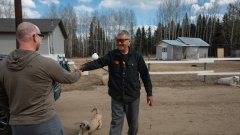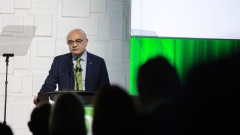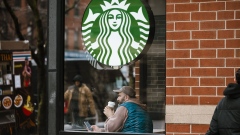Apr 18, 2024
Billionaire Ryan Smith gets his NHL team, moving Arizona Coyotes to Utah
, Bloomberg News

Utah Jazz owner Ryan Smith has officially landed a National Hockey League franchise.
Earlier this afternoon, the league’s board of governors approved a plan to relocate the Arizona Coyotes to Utah for next season. In an unusual deal that helps the NHL avoid a potential arena crisis in Arizona, Smith and his wife Ashley bought the Coyotes’ hockey operations, including player roster and draft picks, from billionaire developer Alex Meruelo, but not the team’s name, logo, uniforms or other intellectual property.
“I don't know if this has ever been done,” said Smith, the 45-year-old billionaire co-founder of online survey company Qualtrics, in a phone interview on Wednesday. “We're creating a new franchise, but we're taking the assets of another one.”
The Utah franchise will get a new name and play the 2024-25 season at the Delta Center in Salt Lake City, the downtown arena where the NBA’s Jazz already play. Smith is flying to Arizona to meet with players on Thursday. According to an earlier report in Sportico, Smith and the partners in his portfolio company, Smith Entertainment Group, agreed to pay US$1 billion to Meruelo and an additional $200 million to the NHL as a relocation fee. Smith declined to comment on financial terms.
The Coyotes, which only made the playoffs once in the past 12 years, have struggled to find a stable venue and ownership since the franchise moved to Arizona from Winnipeg in 1996. Meruelo acquired the team in 2019 for $425 million with the goal of building a new arena in the Phoenix area. In 2022, after Glendale declined to renew the team’s lease at its arena there, the Coyotes moved into a 5,000-seat facility at Arizona State University that it shared with the school's men's hockey team. Last year, voters in Tempe rejected Meruelo’s plan to turn a former landfill into an arena and entertainment district.
Under the terms of the sale, according to Sportico, Meruelo will hold the rights to the Coyotes name for five years while he pursues a new plan to build an arena. If that plan succeeds, he will pay $1 billion to the NHL in return for an expansion franchise. If not, he will keep the money. The deal is reminiscent of an arrangement made between Cleveland and the NFL after Art Modell moved the Browns to Baltimore in 1996. Modell took the players and renamed the team the Ravens. Cleveland revived the Browns three years later as an expansion team under a new owner.
For the NHL, whose TV ratings have been resurgent this season, the deal provides a fresh start for its most troubled franchise. For Smith, it ends a two-year quest to bring a hockey team to his home state. Smith began discussions with NHL commissioner Gary Bettman in early 2022. Earlier this year, SEG issued a press release formally requesting a team. Bettman and the league first proposed the idea of relocating and rebranding the Coyotes in mid-March and talks progressed quickly from there. SEG has contracted with Brooklyn-based branding agency Doubleday & Cartwright to come up with a name for the team.
The franchise adds to an SEG portfolio that includes the Jazz and the Delta Center, which Smith bought together for $1.66 billion in 2020, as well as soccer teams Real Salt Lake (MLS) and the Utah Royals (NWSL).
The Delta Center has hosted Los Angeles Kings pre-season games for the past three seasons. About 12,000 of its seats, Smith said, are suitable for hockey games. In the short term, SEG plans to modify the venue, building out locker rooms and other accommodations for its new tenant. Longer term, Smith plans to fully renovate the Delta Center. “We want to make the best dual-purpose arena in both the NBA and NHL and we think we've got a plan to do that,” said Smith.
Earlier this year, Utah’s state legislature passed a bill allowing for a sales tax increase that could be used to help fund up to $900 million for a stadium renovation as part of a broader redevelopment of Salt Lake’s downtown. The Delta Center sits a few blocks from both the convention center and the Church of Jesus Christ of Latter-Day Saints’ Salt Lake Temple.
There are, however, still hurdles to pass in getting an arena project approved and SEG will be free to move the team anywhere within Utah.
“We probably would do a lot better financially if we went and plopped down on 100 acres like a lot of other sports groups are doing,” said Smith, who said he already has the land to do so if need be. “But that’s not what this is about for us. It's about the city, the state officials, the universities, the religious side, everyone coming together and saying ‘let's go revitalize this place.’”
Last year, the Jazz made news by leaving the local cable network that had carried the team’s games for nearly two decades in favor of airing games on a free broadcast station and launching their own subscription streaming service. SEG is also putting its NHL team’s games on free TV locally, with Utah 16, an independent station owned by E.W. Scripps Co., broadcasting its games. “We're building a new brand so we definitely need as much exposure as we can get,” said Smith.
The NHL has granted the team local broadcast rights to all of Utah. The Colorado Avalanche and Las Vegas Knights previously held rights within the state.

























